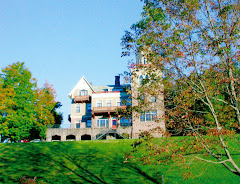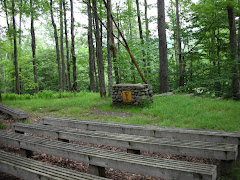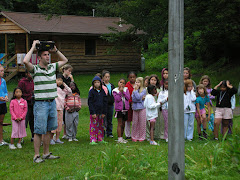 |
| During a visit to Frost Valley four or five years ago: Jim and Dawn with nephew Drew and niece Jesse. |
Jim died young - much too young - but it happened knowingly and consciously and thoughtfully. He died on January 1, 2014. Our hearts go out to Dawn and Eli. When our Frost Valley friends have to go, be they young or very old, the whole Valley family feels the loss. We hope Dawn will visit again sooner rather than later, and that the spirit of camp will embrace her in itself.
When our kids were young - too young to be Frost Valley campers - we would meet at camp and spend three or four days, sometimes a week, together, living in the Castle, taking hikes, participating in camp activities, and doing an annual overnight sleep-out at Banks Hill. During these annual get-togethers I got to see Jim the camp guy and parent, in one: gentle, thoughtful, the most patient father you could imagine, with a wicked but subtle sense of humor and a ready laugh.
If you wish to offer your condolences in words, please try this Facebook page
or send them to Dawn at this address: dhuebnerphd@comcast.net .
Below is Dawn's eulogy for Jim:
***
Jim and I met on February 21, 1981 at a YMCA camp in the
Irish Hills of Michigan. It was a snowy
day. I was a 20 year old junior in
college interviewing for a summer job leading teen-age adventure trips to the
Rocky Mountains. Jim was directing a
weekend environmental education group at the camp, and while he wasn’t formally
involved in the interviews, he was asked to check me out. He did.
I got the job.
Our first real date took place several weeks later in Lansing, Michigan. Even though I was smitten at camp, I was nervous about meeting Jim in a different setting – so I brought my brother, then a freshman in college, on my first date with Jim. We drove an hour to Lansing, where we met at a camping store to buy boots and a backpack, then went to a Chinese restaurant for Moo Shoo Pork. After dinner I felt sure enough to ditch my brother at the MSU library to continue my evening with Jim - alone.
Our first real date took place several weeks later in Lansing, Michigan. Even though I was smitten at camp, I was nervous about meeting Jim in a different setting – so I brought my brother, then a freshman in college, on my first date with Jim. We drove an hour to Lansing, where we met at a camping store to buy boots and a backpack, then went to a Chinese restaurant for Moo Shoo Pork. After dinner I felt sure enough to ditch my brother at the MSU library to continue my evening with Jim - alone.
There was so much I loved about him right from the start: his
warmth, his humor, his beard, his amazing memory. Jim was smart and curious, interested in
everything from the mating habits of gadflies to the fall of the Roman
Empire. He could recount conversations
word-for-word, knew the name of every tree and wildflower when we took walks. He could sing the theme song of just about
any sitcom from the 1970s and 80s and did so, often. Needless to say, you wouldn’t have wanted him
as a rival in Trivial Pursuit; he would have beaten you, hands down.
Which is why it was odd, and scary, when we went to an
appointment some 10 years later at an office we’d been to at least 15 times,
and he didn’t recognize the building. He
couldn’t remember how to get there – a place just 2 miles from where we lived –
the next time we needed to go. And he
started forgetting things, having weird, deja vouix experiences during which
he’d feel certain he had dreamt whatever he was living through. We found out he had temporal lobe epilepsy,
with seizures that would continue first three or four times a week and
eventually as many as 4 a day over
the next 25 years.
The seizures took their toll, as did the hefty doses of
medication he took in a bid to control them.
And with each seizure, he lost a little bit more. He lost his pilot’s license – less than 2
months after he had earned it. He lost
his ability to correctly imprint and retrieve memories, and with it the ability
to reminisce. He lost the ability to
remember names and find words and keep track of plans.
Those of you who knew Jim might be surprised to hear
this. He seemed fine. That’s because he was smart, and used logic,
and took good guesses to fill in the pieces.
He worked tremendously hard to develop compensatory mechanisms, taking
pictures of his students, for example, and studying them every night for
months, trying to memorize their names.
He took copious notes about conversations he had had, commitments he had
made, and he reviewed them all. He
gradually cut out many of his hobbies to focus his energies on keeping his head
above water at school, caring desperately about his students and taking
seriously his mission to instill both a knowledge of and a passion for physics.
And then he developed Type I Diabetes, with the added
complication of needing to track and manage blood sugars, reeling from the
highs and lows he tended to have despite his best efforts at careful
control. And then his accident – last
year – with shattered bones and a punctured lung and large areas of road rash
and secondary MERSA, and worst of all, a head injury. And it all got to be too much.
Over the course of this past year, Jim tried hard to accept
the changes, the losses stacking upon losses.
He continued to work so hard to function to the best of his
ability. He leaned more and more heavily
on me, needing me to orient him, to advocate for him, to make lists and remind
him to use them.
He wanted to thank me by building a shelving unit, something
I very much needed. Jim has built
furniture before. And he was – prior to
moving to NH – a mechanical engineer at Ford, on the design team that built a
solar powered car now on display at the Henry Ford Museum. The shelf he wanted to build was pretty
simple, but he couldn’t do it. He
couldn’t figure out how to measure and cut notches in the 4 posts to make the
shelves equidistant. He made one
attempt, and failed. And another, and
failed again. He couldn’t see it. Couldn’t hold onto what he needed to do to
make those measurements work. I told him
it didn’t matter, but of course it did.
It mattered to him.
It wasn’t that one incident that made Jim decide to stop the
medical treatment that was keeping him alive.
It was that incident and a thousand others like it. It was not having any idea who I was talking
about when I mentioned longtime colleagues of mine by name. It was looking at a photo album and knowing,
intellectually, he was seeing Eli at age 2, but not recognizing him. It was having blood sugars in the 400’s and 20
seizures a month and trouble finding words and an awareness that none of this,
not one single part, would ever get better.
We are immensely grateful to Hospice for conceptualizing
Jim’s wish to discontinue medical treatment as an end-of-life decision he had
the right to make. We are grateful for
the friends who supported us through this immensely painful time, and the
family that has stood by our sides.
Anyone who knew Jim knows he was the consummate
teacher. He cared deeply about his
students, and was so incredibly proud of them for taking on challenges and
pushing past limitations. He put in
countless hours tutoring students struggling to understand Physics, made phone
calls to parents, and even apart from school, often lapsed into detailed explanations
about how things worked.
Jim was known for wearing bow ties. He wore one to school every day. I’m not sure about whether this happened in
his final years but in his early years of teaching he kept a spare bowtie in
his classroom, flinging it across the room when a previously hesitant student
raised their hand to answer a question, or took a chance, working hard to not
just memorize but actually understand what Jim was trying to teach. Getting to wear the class bowtie was an
honor; it meant you had left your comfort zone as a student. It meant Mr. Huebner was proud.
Jim was an amazing man. Brave and strong and loyal and kind. He was an incredible father to Eli, giving him not only the shape of his face but also a strength of character that will allow him to go on, to live, and to breathe, and to love; to contribute to this world in positive ways. Jim helped Eli find and pursue passions of his own, and celebrated Eli for his unique and wonderful spirit. It is in Eli that Jim will live on.
Jim had an amazing collection of bowties which are now on display in the community room. It is Eli’s and my hope that those of you who knew Jim, whether as a teacher, a colleague or a friend, those of you who might be moved to do so, please take one of Jim bowties. The only criteria for ‘earning’ a tie is that you commit yourself to learning something new, be it how to make biscotti or speak Arabic or tie a bowtie - anything of interest to you, anything that doesn’t come naturally but that you are willing to learn. We want Jim’s ties to go out into the world, a reminder of all that he taught, and all that he helped us to learn.
Jim was an amazing man. Brave and strong and loyal and kind. He was an incredible father to Eli, giving him not only the shape of his face but also a strength of character that will allow him to go on, to live, and to breathe, and to love; to contribute to this world in positive ways. Jim helped Eli find and pursue passions of his own, and celebrated Eli for his unique and wonderful spirit. It is in Eli that Jim will live on.
Jim had an amazing collection of bowties which are now on display in the community room. It is Eli’s and my hope that those of you who knew Jim, whether as a teacher, a colleague or a friend, those of you who might be moved to do so, please take one of Jim bowties. The only criteria for ‘earning’ a tie is that you commit yourself to learning something new, be it how to make biscotti or speak Arabic or tie a bowtie - anything of interest to you, anything that doesn’t come naturally but that you are willing to learn. We want Jim’s ties to go out into the world, a reminder of all that he taught, and all that he helped us to learn.
I want to end with the refrain of a song Jim sang at camp
the first night I met him. Those who
knew Jim will recognize his characteristic humor:
Oh Lord it’s hard to be humbleWhen you’re perfect in every wayI can’t wait to look in the mirror‘Cause I get better looking each dayTo know me is to love meI must be a hell of a manOh Lord, it’s hard to be humbleBut I’m doing the best that I can.












